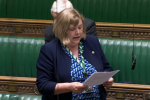Transcript
Jane Hunt MP asked:
As the Minister said, police forces across the country do some great work. That applies to Leicestershire police, particularly Toggle showing location of those in Loughborough who have to deal with county lines. Many of the new officers are based in Loughborough and are doing an excellent job. The increase in the precept is also excellent and very welcome in Leicestershire, but can we do more—that is, not just increase the value of the precept, but ensure that what police are asked to do is more efficient? Redaction is one example. Police should not have to redact evidence when 25% of cases that go to the Crime Prosecution Service are not taken further forward.
Rt Hon. Chris Philp MP, Minister for Crime, Policing and Fire, responded:
My hon. Friend raises an important point. The issue is not just about providing more resources, but making sure that the police can operate efficiently. For example, we are rolling out the “Right Care, Right Person” initiative, which started in Humberside, to make sure that when a mental health case is purely medical, and there is no threat to public safety and no criminality, it is handled medically by the health service. Implementing that across the country will save about 1 million hours a year of police time.
There are other administrative changes that we can make, and the redaction issue is one of them. I discussed that with the new Director of Public Prosecutions, Stephen Parkinson, earlier this week, and I will discuss it with him again in March. Changing the rules around redaction will save very many hours of police time. There are also technology solutions that will help, not just in those 25% of cases in which the CPS decides not to charge, but in the 75% of cases in which it does charge. Automated redaction tools driven by artificial intelligence will save many tens of thousands—probably hundreds of thousands—of hours of police time. I am encouraging police forces up and down the country to adopt that technology to save a huge amount of time.

